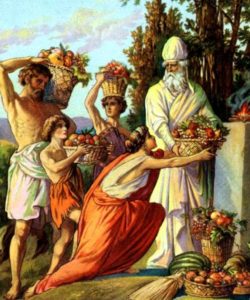
An illustration of bringing bikkurim to the kohen (from the Providence Lithograph Company)
This week’s double parasha, Behar and Bechukotai, begins with the laws of Sabbaticals and Jubilees, and ends with some laws related to tithes. We see here the Torah’s incredible concern for public welfare and social justice—far ahead of its time. The Torah outlines a lengthy system of rules to ensure that the impoverished and the disadvantaged are taken care of, that people have equal opportunities, and that both wealth and land is redistributed to address the disparity between rich and poor, which inevitably results in most societies.
We see, for instance, that at the Jubilee year (every 50th), all lands reverted to their original owners. In Biblical times, when a person purchased land, they were really only leasing it for a number of years, no more than the number of years left until the next Jubilee. So, even if a family had become destitute in the intervening years, and had to sell off all of their land, they could rest assured knowing that they would eventually get their ancestral plot of land back, and have an opportunity to rebuild their wealth. This would ensure that the mega-rich do not swallow up land and grow ever richer (as we unfortunately see all too often today, such as Bill Gates being the largest owner of farmland in America, and Mark Zuckerberg buying nearly an entire Hawaiian island despite the protest of locals). Continue reading
